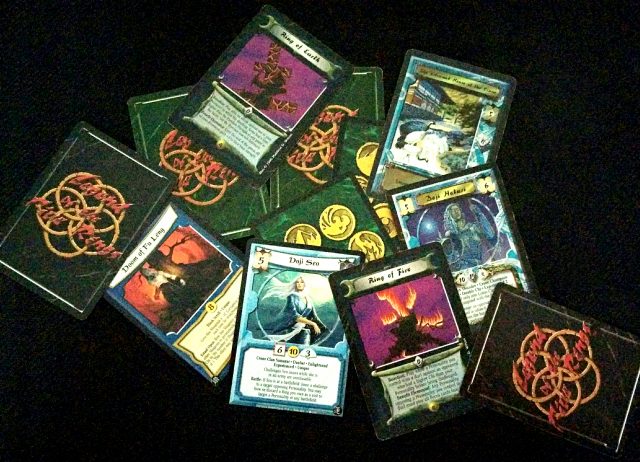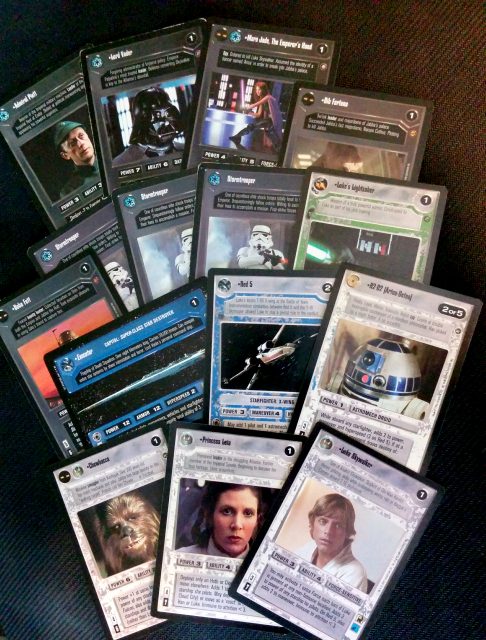I can clearly remember my entry point into hobby gaming. On my twelfth birthday my uncle, who worked at a hobby store at the time, got me a pack of Star Trek Collectable Card Game cards. I was already a young geeky kid who was into Star Trek, but I wasn’t a gamer at all – I might have played Risk! by that point in my life, but I honestly don’t remember. I was really enamored with the cards. I could remember what episodes some of the card art, which were simple screen captures, came from. I remember being utterly confused as to why we couldn’t play a game that evening. He explained to me that I would need more cards, and I would build a deck, and then play against another deck. I got a few more packs of cards, and collected the first set – but not to completion. Rather ironically, I never actually played a complete game of the Star Trek CCG. There just weren’t other players around. The cards still languish in a box somewhere in my parents’ basement, so maybe someday?
Besides being my entry point to gaming, my primary gaming love is CCGs (look, I know there are collectible card games, customizable card games, trading card games, living card games, etc, but we can all accept CCG as a blanket term, right?). Sure, I still have a roleplaying group that meets occasionally, and my Thursday night board gaming group has been going strong for a better part of a decade, but I will always love CCGs. There is something I just can’t get enough of when it comes to building and tuning a deck, sitting down to see what your opponent is playing, and seeing if your deck will cooperate with you to try to win the game.
 I have also developed a love for dead, deadish, and obscure or independent CCGs. If you’ve been around hobby gaming – or card games – long enough, you may need no reminder that in the immediate wake of Magic: The Gathering there was an explosion of card games. While Magic was, and still is, the market leader in card games, the mid 1990s saw a head-spinning number of new card games enter production. While some of them are long gone (does anybody remember OverPower?) some still have a devoted following today (more on that later). I played Magic, but I got out of Magic sometime in early 2000. I’ve also played, and still have prodigious collections for, many of the games that stretch back to the mid 1990s.
I have also developed a love for dead, deadish, and obscure or independent CCGs. If you’ve been around hobby gaming – or card games – long enough, you may need no reminder that in the immediate wake of Magic: The Gathering there was an explosion of card games. While Magic was, and still is, the market leader in card games, the mid 1990s saw a head-spinning number of new card games enter production. While some of them are long gone (does anybody remember OverPower?) some still have a devoted following today (more on that later). I played Magic, but I got out of Magic sometime in early 2000. I’ve also played, and still have prodigious collections for, many of the games that stretch back to the mid 1990s.
One of the things I love the most about CCGs is the aspect of building your deck. This is, for some, the aspect that turns them off of CCGs. There’s an art and a skill to finding the right combination of cards, the right ratio of cards, and the resources to make it all work. This is an art and a science that I’m not tremendously skilled at, to be honest. I love card games, but my win-to-loss ratio tilts heavily towards the loss. Maybe that’s because sometimes I like to build kooky rather than serious decks? Showing up to play cards when the theme of your deck is “all the characters in it are wearing sunglasses” when everybody else shows up to win is the equivalent to showing up to a gun fight with a wet paper bag. It’s a fun “intellectual” exercise to build a deck that way, and it can be fun to play the deck, but I don’t frequently win when I do that. But, if you have fun, it can’t be that bad, right?
Once you have your deck built, perhaps the most fun aspect for me is the socialness of playing the game. Card games, like board games and roleplaying games, lets me get to the table with my pals. Part of the fun is seeing the game unfolding in front of you, and part of the fun is developing a narrative as the game plays out. You can get to replay the Battle of Hoth in the old Decipher Star Wars CCG, and you can narrate the Battle in your mind, or out loud. Maybe Wedge is the hero. Maybe Luke doesn’t get shot down. Maybe the Empire completely crushes the Rebel forces before the first transport gets away. Shadowfist presents equal opportunities for us to narrate out what’s happening in the action scenes. This may just be a part of my group of players, but developing a fun story at the table as the game plays out is part of the fun for me.
 The collectable aspect of CCGs is, like deckbuilding, what can drawn people just as much as it turns them away. I’ll admit that as a fan of the hobby I really do like the turn to non-collectable games. It is good to know that if I ever want to get into Netrunner, for example, “all I have to do” is go out and buy the cards. I don’t need to go rare-chasing. CCGs have been likened, and perhaps justifiably, to a cardboard arms race: the person who spends the most on their collection is the most likely to have the best cards for their deck. It is maddening that, frequently, the best cards are the rare cards. This certainly presents a barrier to play to some. That said, I also have enjoyed the collecting aspect of the game. There’s something thrilling about narrowing down your list of “cards I’m missing” to ten, and then seeking out those ten final cards. I have a number of complete sets of games, and I have games where I’m missing chunks as well. On the whole, I think that non-collectable games is probably the best model, as it means the most people can get the most enjoyment out of the game. I’m probably not the first person to have this thought, as it seems almost all CCGs in production today are based on the non-collectable model.
The collectable aspect of CCGs is, like deckbuilding, what can drawn people just as much as it turns them away. I’ll admit that as a fan of the hobby I really do like the turn to non-collectable games. It is good to know that if I ever want to get into Netrunner, for example, “all I have to do” is go out and buy the cards. I don’t need to go rare-chasing. CCGs have been likened, and perhaps justifiably, to a cardboard arms race: the person who spends the most on their collection is the most likely to have the best cards for their deck. It is maddening that, frequently, the best cards are the rare cards. This certainly presents a barrier to play to some. That said, I also have enjoyed the collecting aspect of the game. There’s something thrilling about narrowing down your list of “cards I’m missing” to ten, and then seeking out those ten final cards. I have a number of complete sets of games, and I have games where I’m missing chunks as well. On the whole, I think that non-collectable games is probably the best model, as it means the most people can get the most enjoyment out of the game. I’m probably not the first person to have this thought, as it seems almost all CCGs in production today are based on the non-collectable model.
Which brings me to the point of Crusty Cardboard. I want to talk about card games with you. Specifically, I want to talk about dead, deadish, or independent card games. I’m planning on writing a column on a semi-regular basis. In it, I’ll be reviewing card games. Let’s start out with what I won’t be touching on. There’s enough on the internet about Magic. Plus, I haven’t played in 17 years, and honestly don’t have much of a desire to play again. I also won’t be touching on the Japanese CCGs, your Cardfight!! Vanguard, your Force of Will, your Yu Gi Oh!. I’m sure they’re good enough games (they’re all good games, Tim), but they really aren’t for me – and they also have a big enough following that they don’t need some crusty old grognard telling you why you should play them. I’m also not going to be touching on card-games-cum-board-games. Games that have cards in them, your Dominion, your 51st State, aren’t CCGs. Lastly, while I’m not opposed to spilling virtual ink over newer CCGs, my main focus will be on games that are of the beaten path.
So, dear reader, stay tuned. Watch this space for some reviews on card games that you may have missed, or games you’re curious about. I’ll tell you all about them.
I used to play OverPower and I LOVED the game! 😀 I even moved on to the VS CCG (not this new imposter based on the original) and enjoyed the game tremendously!
On CCG vs LCG:
In 1994 Columbia Games “Dixie” — an American Civil War CCG… …had each card printed in equal number (no rarity) but then printed each card with a bronze (rare), silver (uncommon) or gold (rare) border — separating collectability and playability.
If I were more cynical, I would suggest no-one in the industry followed that model because “chasing playable rares” made people buy more packs.
Although it certainly never had mass market appeal, it was a decent enough game.